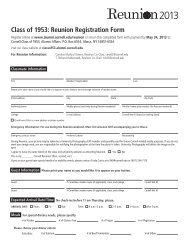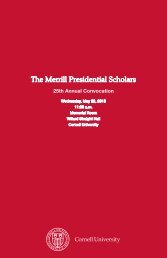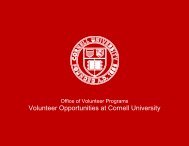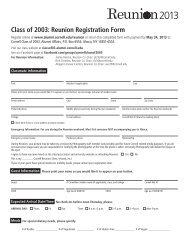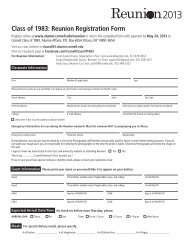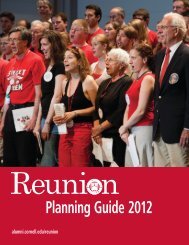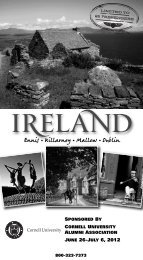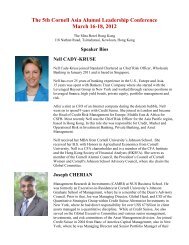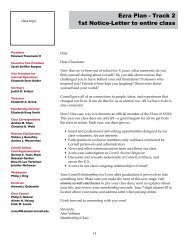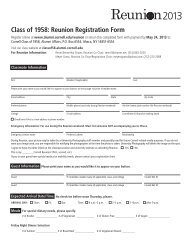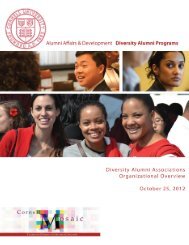Turning 20! - Alumni - Cornell University
Turning 20! - Alumni - Cornell University
Turning 20! - Alumni - Cornell University
You also want an ePaper? Increase the reach of your titles
YUMPU automatically turns print PDFs into web optimized ePapers that Google loves.
FACULTY 6<br />
Confronting Gender Issues in Academia<br />
During the very first meeting of its new President’s Council<br />
of <strong>Cornell</strong> Women in New York City <strong>20</strong> years ago, <strong>Cornell</strong><br />
directed the attention of the chosen alumnae in its new organization<br />
to the issue of gender inequity in higher education.<br />
In addition to hearing a warm welcome and sense of purpose<br />
from President Frank H. T. Rhodes, who established PCCW,<br />
speakers from campus included Dean William Streett and Prof.<br />
Christine Shoemaker from the College of Engineering. They<br />
described the small percentage of women on faculty, lack of<br />
candidates “in the pipeline,” and difficulties such as discrimination<br />
or lack of support for women students. A lively discussion<br />
followed on the extent to which other <strong>Cornell</strong> colleges were<br />
addressing these and related issues including tenure and sexism.<br />
PCCW charter members who took up Dean Streett’s challenge,<br />
organized under a task force titled Faculty & Administration. The<br />
Recruiting and Retention of women across the <strong>University</strong> was<br />
regularly addressed, and the <strong>University</strong>’s annual Inclusion Reports<br />
were of great interest to members. Progress came gradually, but<br />
members were encouraged by the continued support of President<br />
Rhodes and his successor, President Hunter R. Rawlings III. (see<br />
related story in Alumnae section)<br />
Faculty Interaction<br />
At the same time, PCCW members were learning about<br />
impressive women from colleges and disciplines across the<br />
campus, invited as speakers or panelists, and to receptions, during<br />
PCCW member meetings. Carol MacCorkle, PCCW Chair in<br />
1993-1995, cites organizing our first reception for women faculty as<br />
the most memorable experience of her tenure:<br />
“They were so appreciative of being recognized and of<br />
meeting <strong>Cornell</strong> alumnae who were interested in them. Also,<br />
they were delighted to meet other women faculty members<br />
as, rarely, did they have the opportunity to do this outside of<br />
their departments!”<br />
Carol MacCorkle’s perceptions were echoed a decade later in<br />
a <strong>20</strong>06 survey by the then <strong>University</strong> Relations Committee. Led<br />
by Andrea Williams PCCW 1996, and Jaclyn Spear (Engineering)<br />
PCCW 1993, members tallied responses from 37 junior faculty<br />
In <strong>20</strong>06, <strong>Cornell</strong> efforts toward gender equity were boosted by<br />
a five-year, $3.3 million ADVANCE grant from the National<br />
Science Foundation (NSF) to <strong>Cornell</strong> Provost (Carolyn) “Biddy”<br />
Martin, to advance women in the sciences and engineering. Since<br />
then, <strong>Cornell</strong> has established the <strong>Cornell</strong> ADVANCE Center to<br />
implement the NSF grant, set goals and initiated related programs.<br />
Provost Kent Fuchs (former Engineering Dean and an advocate for<br />
women) is the grant’s Principal Investigator and Dr. Yael Levitte is<br />
the Center’s executive director.<br />
The Center’s current goals, set for October <strong>20</strong>11, include:<br />
• Increasing women faculty in every science/engineering<br />
department to at least <strong>20</strong>%<br />
• Hiring 75 women faculty including at least 15 who are<br />
“senior” (have tenure)<br />
• Improving the climate for women faculty in science and<br />
engineering.<br />
In <strong>20</strong>09, recruitment-training modules developed by the CU<br />
ADVANCE Center have assisted search committees in generating<br />
diverse pools of candidates for faculty positions, and the center<br />
has helped the Provost address dual career issues for candidates’<br />
partners/spouses.<br />
Yet, despite these and other efforts, significant challenges<br />
remain, especially in retention. A November <strong>20</strong>09 report to the NSF<br />
noted that in <strong>20</strong>06 to <strong>20</strong>09, <strong>Cornell</strong> recruited 41 women faculty in<br />
still at <strong>Cornell</strong> who had received PCCW ‘tenure track’ grants, by<br />
then known as the Affinito-Stewart Grants Program. A question<br />
on additional ways in which PCCW might support women faculty<br />
elicited numerous responses like this one:<br />
There is a new generation of junior women coming into the<br />
university which is making significant changes -- however most<br />
departments here are very ‘top heavy’ with senior men. To my<br />
knowledge, there are no institutional venues for junior women<br />
to get together to strategize as to how to address these responsibilities<br />
and expectations. . . I would love to see some regular<br />
social venue to get in touch with other female faculty members.<br />
Significant Progress<br />
Today, the situation at <strong>Cornell</strong> is very different. As the times<br />
have changed, gender issues have become more prominent<br />
and <strong>Cornell</strong> has moved aggressively to improve recruitment,<br />
promotion, and retention of women faculty and administrators.<br />
These statistics from a recent annual Equity and Inclusion Report<br />
illustrate significant progress.<br />
Women on <strong>Cornell</strong> Faculty<br />
1998-99 312 or <strong>20</strong>.2%of total<br />
<strong>20</strong>08-09 432 or 26.4%<br />
Women on Engineering Faculty<br />
1989-99 17 or 7.8%<br />
<strong>20</strong>08-09 30 or 12.7%<br />
<strong>Cornell</strong> ADVANCE Center: Speaks to Mission and Challenges<br />
science and engineering, but the net gain was only 21 because <strong>20</strong><br />
women faculty had left <strong>Cornell</strong>.<br />
Recently, PCCW members were extremely pleased to learn of<br />
plans to extend and expand the ADVANCE Center’s objectives<br />
after the NSF grant is completed in November <strong>20</strong>11. Provost Fuchs<br />
has established an ADVANCE Transition Steering Committee<br />
whose members will recommend specific ways to institutionalize<br />
ADVANCE Center activities. For example, the ADVANCE Center<br />
video training for department chairs ought to be incorporated into<br />
regular <strong>University</strong> functions. The Steering Committee will also<br />
address the commitment of <strong>University</strong> resources for ADVANCE<br />
Center functions after NSF grant funds are exhausted.<br />
In terms of evaluation, ongoing ADVANCE data gathering<br />
includes reporting on hiring statistics after departments and search<br />
committees have undergone training. The new Steering Committee<br />
will also recommend that similar data gathering be used in<br />
additional departments and offices.<br />
In addition, Provost Fuchs intends that the ADVANCE Center<br />
objectives, planning and resources will be broadened to include<br />
women in all areas of the <strong>University</strong>. All of us are thrilled that the<br />
wonderful work begun by the ADVANCE Center will continue and<br />
become available to faculty in the humanities as well as in science.<br />
At the same time, this exciting news underscores our recognition<br />
that gender inequity in academia still needs our attention, and that<br />
<strong>Cornell</strong> is bent on sustaining its historic leadership role.<br />
by Carolyn P. Landis, Chair, PCCW <strong>20</strong>09-<strong>20</strong>11



